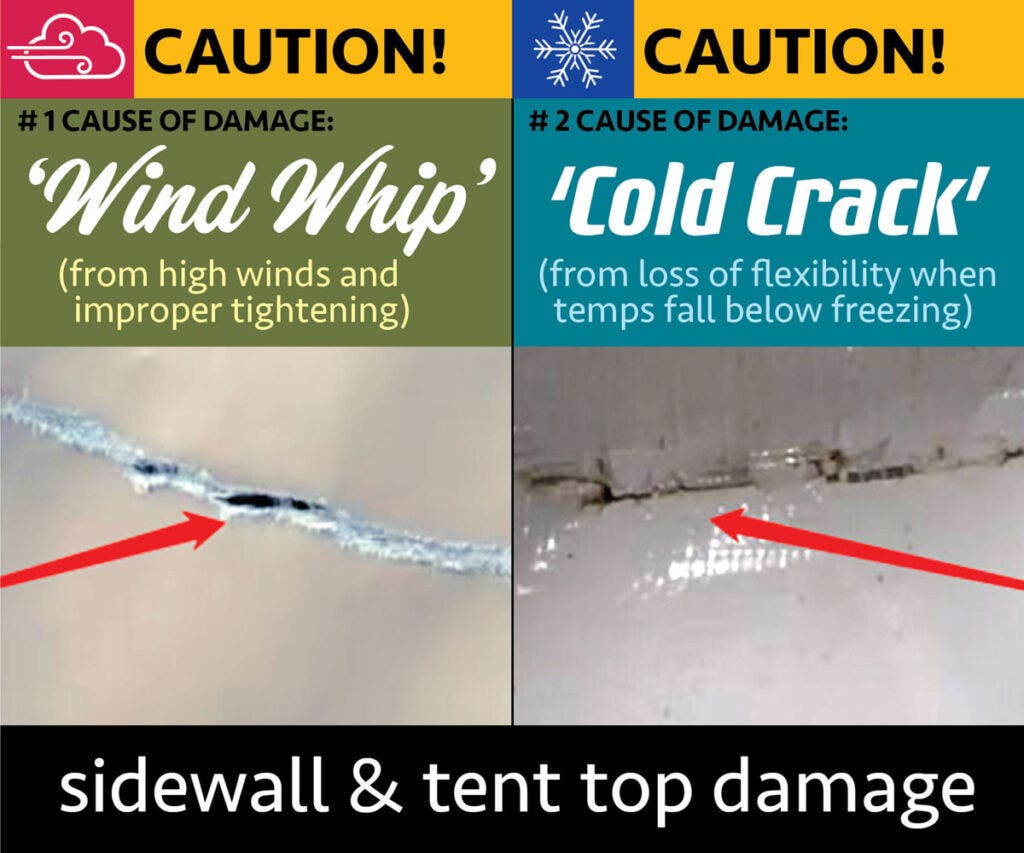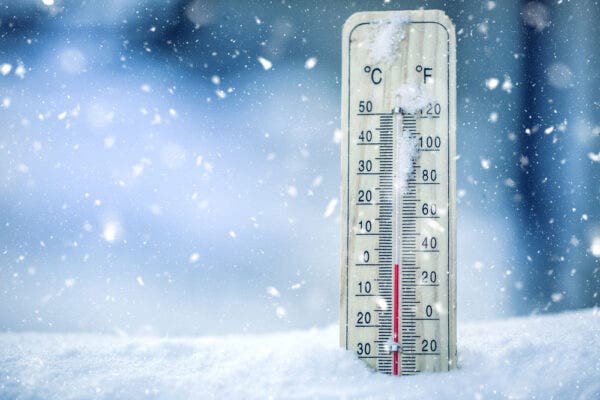Even the Toughest Party Tents Don’t Fare Well in Freezing Cold
Heavy duty party tents can put up with a lot of abuse compared with consumer grade tents. Party rentals can get pretty rough, after all. But even the toughest commercial party tents aren’t invincible. And if there’s one thing that proves that, it’s extreme cold.
For a lot of the country, the weather is starting to get cooler. Some areas have already seen significant snowfall, even. And as the air gets cooler, we need to stop and ask ourselves an important question. Just how far into the year can we continue using our party tents before exposing them to cold weather damage?
Heavy duty party tents work well through most of the year. You can even set them up some days during the winter. But freezing temperatures are extremely dangerous for even the toughest heavy duty party tents. And it’s important to know exactly what conditions you should keep your tents away from.
Wind Whip and Cold Cracking do Very Serious Damage
There are two types of cold weather damage that commonly happen in cold weather: wind whip and cold cracking. And while both types can be repaired using party tent repair kits and tools, it’s of course a lot easier to just avoid the damage in the first place.
“Wind whip” happens when a tent sidewall or tent top isn’t properly tightened and secured. As the wind whips the tent top or sidewall around, the vinyl stretches and gets brittle. Over time, this causes the scrim or base fabric to tear, making sizable holes in the material. Not only does wind whip cause scarring, it can also puncture straight through the fabric and make holes large enough to fit your fingers into.
Cold crack does slightly less damage, but it’s definitely not pretty. Freezing cold strips vinyl of its flexibility, causing stress cracks to appear. These cracks appear along tent top and tent sidewall fold lines. These cracks don’t usually tear the base fabric, though it’s possible. And the scarring will usually be severe enough to let air through, and maybe even water.
Tent tops and tent sidewalls should only be used in temperatures exceeding 40 degrees fahrenheit. Not only does colder weather potentially damage your party tent, it also voids your warranty, so don’t set up party tents in extreme cold unless you’re willing to take on all of that risk.
If you absolutely must set up in the cold, remember to frequently tighten tent tops and anchor tent sidewalls to prevent movement. Secure your sidewalls on the top, the sides, and the bottom. Also, do not fold up your tops or sidewalls, opting instead to gently ball them up.
Safety Precautions for Ordering Tents in Cold Weather
Winter is the down season for most event and party rental companies. Rental operators often use these slower months to replace aging stock and grow their inventories with new heavy duty party tents, commercial inflatables, portable dance floors, and other rental equipment. But receiving a new party tent in cold weather does require a few additional safety precautions you wouldn’t need in the summer months.
When your new tent top or tent sidewall arrives, bring it indoors into a warm area before opening it. Remember, during shipping your tent spent a lot of time in a cold delivery truck, and transitioning into and out of the freezing cold and back again. While the risk is slightly mitigated, there’s still significant danger the material will crack if you try unpacking it right away.
Instead, bring your new party tent indoors and give it some time to warm up. If the box still feels cold to the touch, wait a little while longer. Also, don’t try to force the packaged tent to get warm faster, as rapidly transitioning from cold to hot can cause damage as well, to party tents and just about anything else.
Heavy Duty Party Tents are Designed for Spring, Summer, and Fall
Commercial grade heavy duty party tents will last a long time, but they do require a little TLC. Keeping tops and sidewalls clean, repairing damage when you spot it, and keeping them out of extreme weather will ensure your party tent is functional and earning money for you year after year.
You can still use your party tents in cooler weather, of course, and that does include some of the winter months. If the weather is unseasonably mild, go for it! We even have a whole article devoted to keeping party tents warm in winter. But you should consider party tents to be spring, summer, and fall equipment. And that goes for vinyl commercial inflatables too, like bounce houses and inflatable obstacle courses.
Nobody likes to move outdoor parties indoors or worse, postpone or cancel them. But taking your equipment into extreme cold conditions will expose your equipment to a lot of unnecessary risk. Not only is it harder to set up in these conditions, your equipment itself can and likely will take damage.
While these cold weather jobs might pay more, you have to ask yourself if you’ll end up paying more to replace your damaged tent top or sidewalls. The bottom line is this: your undamaged tent will make more money in warm weather with several bookings than this one winter event.




